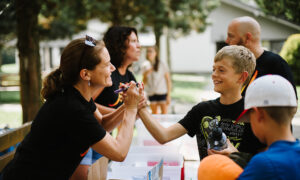June 10, 2021
5 Ways to Care for Missionary Kids on Home Assignment
I remember the feeling like it was yesterday—rolling my tiny suitcase down the driveway, with butterflies in my stomach, eagerly anticipating the adventure that was ahead. It was an adventure that happened only every few years—home assignment. I grew up as a missionary kid (MK) in Czech my whole life, being the child of Josiah Venture missionaries. Czech was (and still is!) home to me. As a result, it always felt funny to me when we used the term “home” assignment to describe our trip to visit dear supporters, churches and family in my passport country. As a kid, I often used a much simpler term to describe our family’s home assignment: “Going to America”.
While home assignment often felt like an adventure, there were days when I felt alone, exhausted, confused, or like an outsider. Some days, I felt pressure to say the right thing and didn’t know how to answer questions I was asked. Those days were hard.
If you’ve ever wondered what you could do to help MKs feel more connected, welcomed, and loved when they “come to America” (or their passport country) for home assignment, thank you! Your care for us MKs along the way means more than you’ll ever know. Whether you’re meeting MKs for the first time or counting down the days until you can see them, I hope these tips bring fresh inspiration to caring for them while they’re on home assignment with their families.

1) Ask for parents’ insight about how to relate with their kids
Parents know their kids best! If you can, talk with the missionary parents before they come to church on Sunday, or before you meet up with them, and ask them how you can best support their kids while you are together.
Some kids genuinely enjoy standing with their parents at the missionary table and listening to the adults talk and have conversations (that was me as a kid!). Other kids love making new friends and want to jump into the Sunday morning kids’ programs, or play tag outside with the kids from church after the service. There are kids who enjoy the spotlight and get excited about singing a song in their second language in front of the church. Other kids would rather sink into the floor than have to say anything in front of people. They might prefer to blend in and make friends, or simply observe the world around them.
Ask parents about each of their kids specifically, since every kid has different needs. Then, see how you can help!
2) Introduce yourself like it’s the first time you’re meeting
I’m embarrassed to admit how many times I pretended to remember someone while visiting supporters with my family. One time, someone super kind warmly greeted me on a Sunday after church, and a full 5-minute conversation ensued. Upon them leaving, I quietly turned to my parents and said, “How do I know that person?” Not one of my proudest moments.
MKs often hear something like, “Hi, I’m Barbara, do you remember me? I used to babysit you!” or “Oh, it’s so good to see you! Wow, you’ve grown so tall!” While these are warm and well intentioned comments, this can put MKs in an awkward position. They may feel guilty for not remembering you, or they may want to act like they do indeed remember you (even if they don’t). If MKs are back in their passport country for the first time in three years, it may be really hard for them to recall a lot of names and faces from previous years. Help them out by introducing yourself!
If you introduce yourself in the same way you would if you were meeting for the first time, or if you remind them how you’re connected to their family, it will give them more freedom to be themselves. And, who knows, maybe one day they will actually say, “Oh yeah, I remember you!! You’re the one who picked us up from the airport a few years ago and told the story about the alligators!”

3) Ask specific, open-ended, simple questions (S.O.S. Questions!)
“Which country do you like living in better?” or “Do you have any friends there?” can feel like a lot of pressure for MKs. These are specific, yet very closed-ended questions. On the other hand, questions that are open but too broad or abstract can also feel intimidating. “How can we be praying for you?” or “What’s it like living in Hungary?” might be great questions for adults, but MKs are often at a loss for words to answer these questions on the spot.
One question MKs are frequently asked is, “Can you say something in (insert second language)?” This can be a surprisingly hard question to answer, even if they speak the language fluently! Try something more specific instead. Consider asking, “Can you teach me how to say ________ in (insert second language)?” For example, “Can you teach me how to say ‘you’re awesome’ in Polish?” or “Can you teach me how to say ‘I like eating potatoes’ in Croatian?” Making a small shift in the way you ask this common type of question that MKs get asked can not only relieve the pressure for them. It can also be a source of humor and connection as you attempt to remember the phrase and say it back to them. Bonus points for coming up to them randomly and saying the words when you see them again! That will often bring out a smile!
Here are some other tips on tweaking questions to help MK’s feel more loved…
- Instead of, “Do you have friends there?” ask, “Who are some people you enjoy spending time with at home in Ukraine?” or “What’s something fun you’ve done with your friends in Slovenia?”
- Instead of, “Which country do you like living in better?” ask, “What’s something you think is cool about Bulgaria?” or “What’s something you miss from America when you’re home in Czech?” You can flip this question around too, and ask, “What’s something you miss from Czech when you’re visiting America?”
- Instead of, “How can I be praying for you?” (which can sometimes be a tough question for kids to answer!) you could ask, “What’s something kind of stressful or challenging that you’ve experienced in Slovakia recently?” Listen to their answers, and ask follow-up questions if they want to talk about it. After listening to their stories, you can say, “Wow, yeah, that does sound tough! I’d love to be praying for you for ________ .“ Here you could insert that area of their life—e.g. for new friends, for kind teachers, for school in their second language, etc.).
4) Invite them to join you in what you’re doing
If you’re welcoming MK’s into your home, share your hobbies and interests with them. I still remember the time one of our family’s supporters taught me how to knit. Knitting became my new favorite pastime on long car rides during that home assignment. I’m actually not much of a knitter today, but I still feel loved when I remember the woman who once took the time to teach me how to knit while we were in their home!
Think about some of the things you enjoy doing. Ask MKs if they’d like to join you and try something new. Do you make the best homemade kettle corn? Invite the kids to learn how to make it with you! Do you love building birdhouses? Do you play baseball in your free time? Let them paint a birdhouse you made, or coach them in pitching a baseball. You’ll not only teach them valuable skills, but they’ll feel so loved that you’d care enough to spend that time with them.
On Sundays, this may look a little different, but the same idea goes a long way. Are you teaching Sunday School? Ask them if they’d like to come with you and introduce them to other kids their age. Are you setting up chairs for the service? Invite them to join in and have a fun conversation as you go (and ask their parents first, of course!). Are you the same age as the MK? Invite them to play in the church gym with you and your friends after the service. You can even introduce them to other teenagers from the youth group and find out what you all have in common together.
5) Welcome them into the fold, rather than asking them to perform
In general, MKs long to belong wherever they go. They spend much of their lives observing and adapting to the world around them, and they are skilled at figuring out how to fit in. Give them the chance to feel at home in your church or community whenever they visit.
If you’d like for an MK to share something about life as a missionary kid in Sunday school or youth group, ask them beforehand. Then, give them the chance to say “sure!” or “I’d rather not.”
In conversations, ask them about their lives in their countries, and be intentional about getting to know them for who they are. At the same time, give them space to belong and feel like they are welcomed to belong (and not stand out so much!), even if they’re only at church for a day or in town for a week. Treat them “as your own,” and remind them that they matter to you.
Thank you for investing in missionary kids! We are like sponges, constantly observing and taking in the world around us. When you spend time with us and take time to see our needs, it really means a lot. Your words of encouragement, and your actions of love and care, help us feel less alone, and point us to the kindness of God. Sometimes it’s the littlest things that make the biggest difference in our lives.
Written by Claire Patty





